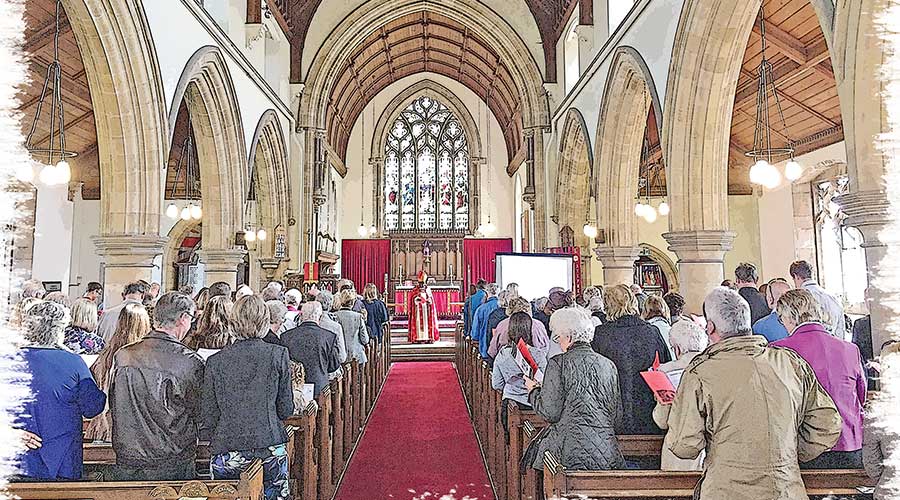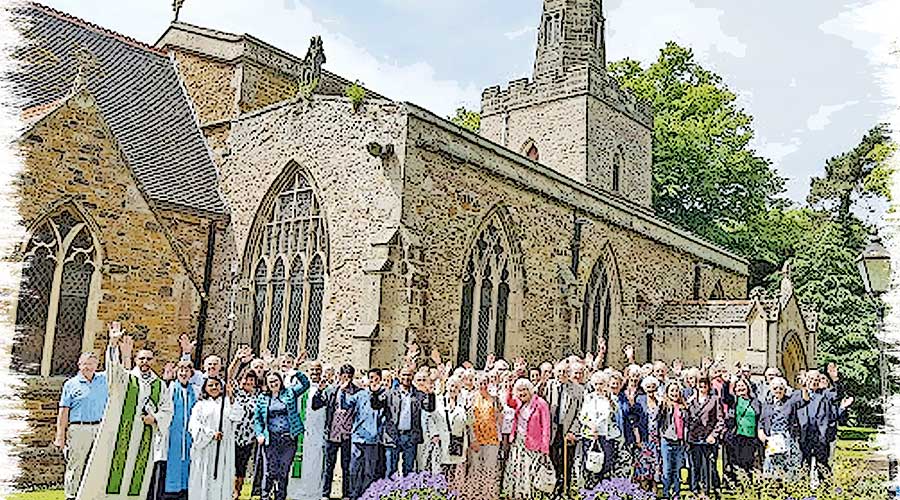THE ORCHARD ON FIRE
- 20 Apr - 26 Apr, 2024

Then, with brow yet bent and without changing by the faintest shade his attitude or voice, he added: "Just hand over that sapphire cross of yours, will you? We're all alone here, and I could pull you to pieces like a straw doll." The utterly unaltered voice and attitude added a strange violence to that shocking change of speech. But the guarder of the relic only seemed to turn his head by the smallest section of the compass. He seemed still to have a somewhat foolish face turned to the stars. Perhaps he had not understood. Or, perhaps, he had understood and sat rigid with terror. "Yes," said the tall priest, in the same low voice and in the same still posture, "yes, I am Flambeau." Then, after a pause, he said: "Come, will you give me that cross?" "No," said the other, and the monosyllable had an odd sound.
By the time he had substantially diminished the distance and magnified the two black figures as in a vast microscope, he had perceived something else; something which startled him, and yet which he had somehow expected. Whoever was the tall priest, there could be no doubt about the identity of the short one. It was his friend of the Harwich train, the stumpy little cure of Essex whom he had warned about his brown paper parcels. Now, so far as this went, everything fitted in finally and rationally enough. Valentin had learned by his inquiries that morning that a Father Brown from Essex was bringing up a silver cross with sapphires, a relic of considerable value, to show some of the foreign priests at the congress. This undoubtedly was the "silver with blue stones"; and Father Brown undoubtedly was the little greenhorn in the train.
"Well," said the woman a little doubtfully, "the clergymen came in about half an hour ago and bought some peppermints and talked a bit, and then went off towards the Heath. But a second after, one of them runs back into the shop and says, 'Have I left a parcel!' Well, I looked everywhere and couldn't see one; so he says, 'Never mind; but if it should turn up, please post it to this address,' and he left me the address and a shilling for my trouble. And sure enough, though I thought I'd looked everywhere, I found he'd left a brown paper parcel, so I posted it to the place he said. I can't remember the address now; it was somewhere in Westminster. But as the thing seemed so important, I thought perhaps the police had come about it." "So they have," said Valentin shortly. "Is Hampstead Heath near here?" "Straight on for fifteen minutes," said the woman, "and you'll come right out on the open." Valentin sprang out of the shop and began to run.
Now there was nothing wonderful about the fact that what Valentin had found out Flambeau had also found out; Flambeau found out everything. Also there was nothing wonderful in the fact that when Flambeau heard of a sapphire cross he should try to steal it; that was the most natural thing in all natural history. And most certainly there was nothing wonderful about the fact that Flambeau should have it all his own way with such a silly sheep as the man with the umbrella and the parcels. He was the sort of man whom anybody could lead on a string to the North Pole; it was not surprising that an actor like Flambeau, dressed as another priest, could lead him to Hampstead Heath. So far the crime seemed clear enough; and while the detective pitied the priest for his helplessness, he almost despised Flambeau for condescending to so gullible a victim. But when Valentin thought of all that had happened in between, of all that had led him to his triumph, he racked his brains for the smallest rhyme or reason in it. What had the stealing of a blue-and-silver cross from a priest from Essex to do with chucking soup at wall paper? What had it to do with calling nuts oranges, or with paying for windows first and breaking them afterwards? He had come to the end of his chase; yet somehow he had missed the middle of it.

"No," said the other priest; "reason is always reasonable, even in the last limbo, in the lost borderland of things. I know that people charge the Church with lowering reason, but it is just the other way. Alone on earth, the Church makes reason really supreme. Alone on earth, the Church affirms that God himself is bound by reason." The other priest raised his austere face to the spangled sky and said: "Yet who knows if in that infinite universe?"
Flambeau suddenly flung off all his pontifical pretensions. The great robber leaned back in his seat and laughed low but long. "No," he cried, "you won't give it me, you proud prelate. You won't give it me, you little celibate simpleton. Shall I tell you why you won't give it me? Because I've got it already in my own pocket." The small man from Essex turned what seemed to be a dazed face in the dusk, and said, with the timid eagerness of "The Private Secretary": "Are are you sure?" Flambeau yelled with delight. "Really, you're as good as a three-act farce," he cried. "Yes, you turnip, I am quite sure. I had the sense to make a duplicate of the right parcel, and now, my friend, you've got the duplicate and I've got the jewels. An old dodge, Father Brown, a very old dodge." "Yes," said Father Brown, and passed his hand through his hair with the same strange vagueness of manner. "Yes, I've heard of it before." The colossus of crime leaned over to the little rustic priest with a sort of sudden interest.
"You have heard of it?" he asked. "Where have you heard of it?" "Well, I mustn't tell you his name, of course," said the little man simply. "He was a penitent, you know. He had lived prosperously for about twenty years entirely on duplicate brown paper parcels. And so, you see, when I began to suspect you, I thought of this poor chap's way of doing it at once." "Began to suspect me?" repeated the outlaw with increased intensity. "Did you really have the gumption to suspect me just because I brought you up to this bare part of the heath?" "No, no," said Brown with an air of apology. "You see, I suspected you when we first met. It's that little bulge up the sleeve where you people have the spiked bracelet." "How in Tartarus," cried Flambeau, "did you ever hear of the spiked bracelet?"
"Oh, one's little flock, you know!" said Father Brown, arching his eyebrows rather blankly. "When I was a curate in Hartlepool, there were three of them with spiked bracelets. So, as I suspected you from the first, don't you see, I made sure that the cross should go safe, anyhow. I'm afraid I watched you, you know. So at last I saw you change the parcels. Then, don't you see, I changed them back again. And then I left the right one behind." "Left it behind?" repeated Flambeau, and for the first time there was another note in his voice beside his triumph. "Well, it was like this," said the little priest, speaking in the same unaffected way. "I went back to that sweet-shop and asked if I'd left a parcel, and gave them a particular address if it turned up. Well, I knew I hadn't; but when I went away again I did. So, instead of running after me with that valuable parcel, they have sent it flying to a friend of mine in Westminster." Then he added rather sadly: "I learnt that, too, from a poor fellow in Hartlepool. He used to do it with handbags he stole at railway stations, but he's in a monastery now. Oh, one gets to know, you know," he added, rubbing his head again with the same sort of desperate apology. "We can't help being priests. People come and tell us these things."

Flambeau tore a brown-paper parcel out of his inner pocket and rent it in pieces. There was nothing but paper and sticks of lead inside it. He sprang to his feet with a gigantic gesture, and cried: "I don't believe you. I don't believe a bumpkin like you could manage all that. I believe you've still got the stuff on you, and if you don't give it up- -why, we're all alone, and I'll take it by force!" "No," said Father Brown simply, and stood up also, "you won't take it by force. First, because I really haven't still got it. And, second, because we are not alone." Flambeau stopped in his stride forward. "Behind that tree," said Father Brown, pointing, "two strong policemen and the greatest detective alive. How did they come here, do you ask? Why, I brought them, of course! How did I do it? Why, I'll tell you if you like! Lord bless you, we have to know twenty such things when we work among the criminal classes! Well, I wasn't sure you were a thief, and it would never do to make a scandal against one of our own clergy. So I just tested you to see if anything would make you show yourself.
A man generally makes a small scene if he finds salt in his coffee; if he doesn't, he has some reason for keeping quiet. I changed the salt and sugar, and you kept quiet. A man generally objects if his bill is three times too big. If he pays it, he has some motive for passing unnoticed. I altered your bill, and you paid it." The world seemed waiting for Flambeau to leap like a tiger. But he was held back as by a spell; he was stunned with the utmost curiosity. "Well," went on Father Brown, with lumbering lucidity, "as you wouldn't leave any tracks for the police, of course somebody had to. At every place we went to, I took care to do something that would get us talked about for the rest of the day. I didn't do much harm--a splashed wall, spilt apples, a broken window; but I saved the cross, as the cross will always be saved. It is at Westminster by now. I rather wonder you didn't stop it with the Donkey's Whistle." "With the what?" asked Flambeau.
"I'm glad you've never heard of it," said the priest, making a face. "It's a foul thing. I'm sure you're too good a man for a Whistler. I couldn't have countered it even with the Spots myself; I'm not strong enough in the legs." "What on earth are you talking about?" asked the other. "Well, I did think you'd know the Spots," said Father Brown, agreeably surprised. "Oh, you can't have gone so very wrong yet!" "How in blazes do you know all these horrors?" cried Flambeau. The shadow of a smile crossed the round, simple face of his clerical opponent. "Oh, by being a celibate simpleton, I suppose," he said. "Has it never struck you that a man who does next to nothing but hear men's real sins is not likely to be wholly unaware of human evil? But, as a matter of fact, another part of my trade, too, made me sure you weren't a priest." "What?" asked the thief, almost gaping? "You attacked reason," said Father Brown. "It's bad theology." And even as he turned away to collect his property, the three policemen came out from under the twilight trees. Flambeau was an artist and a sportsman. He stepped back and swept Valentin a great bow. "Do not bow to me, mon ami," said Valentin with silver clearness. "Let us both bow to our master." And they both stood an instant while the little Essex priest blinked about for his umbrella.
COMMENTS